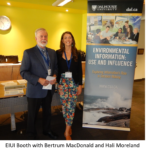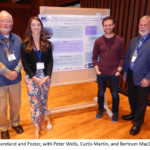“You have a voice, use your voice to protect the ocean.” This statement was a key message from the opening panel of the annual Sustainable Oceans Conference. Organized by students in the Master of Marine Management program at Dalhousie University, the 2019 conference on 27-28 September featured oral presentations, posters, a public panel, and a keynote address by Dr. Emma McKinley, Cardiff University, Wales, entitled “One Ocean, Infinite Connections: Connecting People and the Sea.”
 With the broad theme of “One Ocean: Infinite Connections,” the conference aimed to “build bridges between diverse knowledge groups and encourage individuals to consider a new knowledge perspective towards the ocean.” A large audience of undergraduate and graduate students from several institutions, researchers, ocean managers, entrepreneurs, and the interested public was given the opportunity to learn about wide-ranging research on ocean management issues, engage in lively discussion with the presenters, and strengthen their understanding of the complex social, economic, and environmental concerns motivating many to seek and apply solutions to deteriorating ocean conditions. The conference organizers anticipated that attendees would leave with a “sense of optimism in how society as a whole can work together to improve ocean and coastal management” and to a large degree that happened.
With the broad theme of “One Ocean: Infinite Connections,” the conference aimed to “build bridges between diverse knowledge groups and encourage individuals to consider a new knowledge perspective towards the ocean.” A large audience of undergraduate and graduate students from several institutions, researchers, ocean managers, entrepreneurs, and the interested public was given the opportunity to learn about wide-ranging research on ocean management issues, engage in lively discussion with the presenters, and strengthen their understanding of the complex social, economic, and environmental concerns motivating many to seek and apply solutions to deteriorating ocean conditions. The conference organizers anticipated that attendees would leave with a “sense of optimism in how society as a whole can work together to improve ocean and coastal management” and to a large degree that happened.
The importance of information and evidence for informed decisions was evident in many presentations throughout the conference. Multiple poster and oral presentations exemplified this theme. For example, Breanna Bishop explained her work on mobilizing Inuit knowledge into marine research. Similarly, Chelsea Boaler illustrated how various “ways of knowing” may be incorporated into the management of capelin in Northern Labrador. In her poster, Gillian Curren outlined the cumulative effects in marine conservation, paying particular attention to the lack of integration in marine policy, despite mounting evidence. Not only does this selection of research interests highlight the importance of information and evidence in decision-making across Canada, it reveals the truly multidisciplinary nature of the Sustainable Oceans Conference participants.
The Friday night panel focused on emerging issues in Atlantic Canada’s coastal and marine resources and how to reconcile them while simultaneously addressing a diversity of users. The panel was chaired by Megan Bailey, Canada Research Chair in Integrated Coastal and Ocean Governance, and included representatives of four stakeholders relevant to the topic: Rachel Bailey, the mayor of Lunenburg, Nova Scotia; Ramőn Filgueira, a Dalhousie professor specializing in aquaculture and ecosystem based management; Colin Sproul, president of the Bay of Fundy Inshore Fishermen’s Association; and Sigrid Kuehnemund, Vice President of Ocean Conservation at WWF Canada. The discussion focused on solution-based approaches to the overarching theme, including whether the panelists had found any unexpected allies in their experiences, and what they envisioned for the future of Nova Scotia’s marine and coastal environment. Barriers to realizing an ideal future were noted by several of the panelists, including Mayor Bailey, who emphasized the challenge of decision-making when information was conflicting or evidence was simply not readily available. Similarly, Colin Sproul noted that marine conservation in Nova Scotia was hampered by a lack of trust in institutions, particularly by fishermen, which may restrict the uptake of environmental information. Overall, the panel discussion was a well-rounded and energetic conversation, and instilled conference attendees with a new appreciation for the challenges and benefits of reconciling differences in a dynamic and evolving ocean space.
To close out the conference, Dr. Emma McKinley spoke on the role of marine social sciences in working toward ocean solutions. Because challenges of marine management often involve complex human dimensions, Dr. McKinley emphasized the need to integrate social and natural science research. She also noted that in order for society to be part of the solution to marine management issues, researchers must consider a multiplicity of values, stakeholders, and worldviews. To round off the discussion, Dr. McKinley introduced the Marine Social Sciences Network – a recently launched international, interdisciplinary community of researchers and practitioners. Dr. McKinley hopes that the network will support communication and articulation of the complex and complicated relationship between society and the global seas and coasts, and play an important part in providing evidence to marine policy and management processes.
Hali Moreland, Master of Marine Management student and EIUI team member, presented a poster about her research entitled: “Information source and channel preference in marine policy development: A case study on the Eastern Shore Islands Area of Interest consultation process.”
 Poster Abstract: The Eastern Shore Islands Area of Interest was officially announced as a candidate for federal protection on March 22nd, 2018 by the Department of Fisheries and Oceans (DFO). A large, coastal Area of Interest was new for this region. In order to facilitate public participation, and since public consultation is important in policy development, DFO created a 35-member Advisory Committee, comprised of different stakeholders with a variety of backgrounds. This project is examining the information-related activities of the Advisory Committee members, including their preferred information sources and channels, their patterns of information use, and who they trust to provide accurate information in the consultation process. This project will highlight how information is received and used by stakeholders in a marine conservation context. In particular, the findings may identify enablers and barriers to information use during public engagement processes and more broadly in marine decision-making practices.
Poster Abstract: The Eastern Shore Islands Area of Interest was officially announced as a candidate for federal protection on March 22nd, 2018 by the Department of Fisheries and Oceans (DFO). A large, coastal Area of Interest was new for this region. In order to facilitate public participation, and since public consultation is important in policy development, DFO created a 35-member Advisory Committee, comprised of different stakeholders with a variety of backgrounds. This project is examining the information-related activities of the Advisory Committee members, including their preferred information sources and channels, their patterns of information use, and who they trust to provide accurate information in the consultation process. This project will highlight how information is received and used by stakeholders in a marine conservation context. In particular, the findings may identify enablers and barriers to information use during public engagement processes and more broadly in marine decision-making practices.
In addition, EIUI team members provided a booth in the Community Organization Fair to highlight research being conducted about questions regarding the use of information in marine environmental decision making.